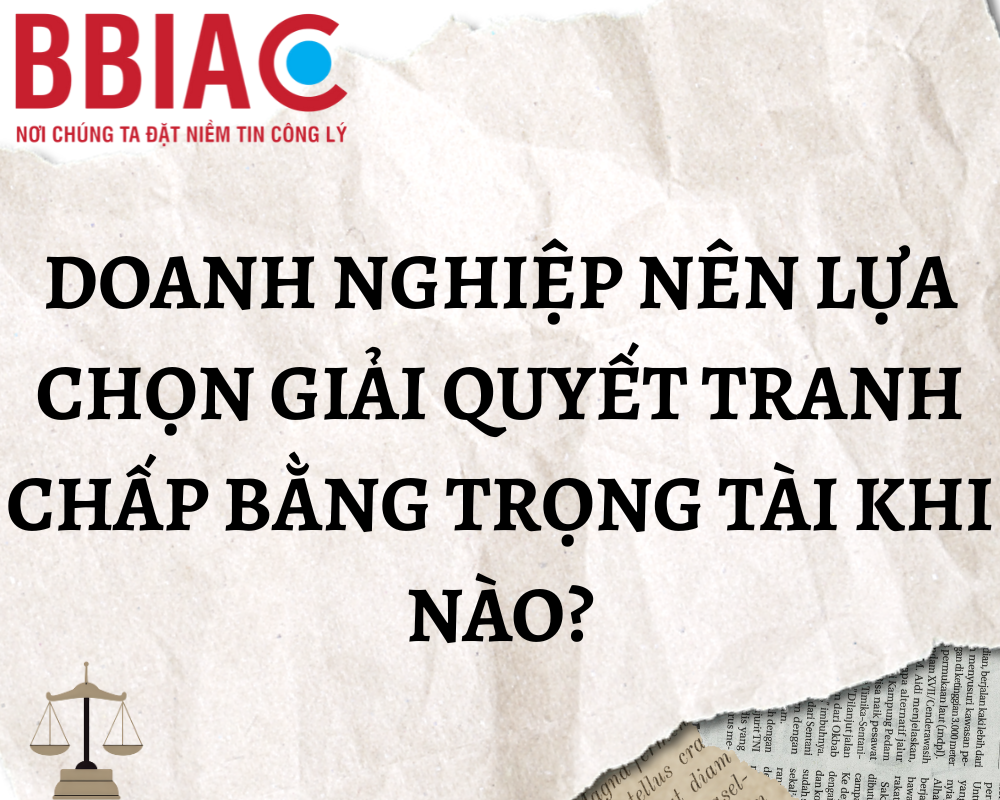When should enterprises choose to resolve disputes through commercial arbitration?

1. Why should enterprises choose commercial arbitration to resolve disputes?
The reason why enterprises choose commercial arbitration centers is that arbitral procedures possess several advantages, specifically:
- Regarding arbitral procedures, they are convenient, expeditious, flexible, simpler, and more adaptable in procedural aspects. The disputing parties may proactively determine the time and venue for dispute resolution based on their free agreement, without being bound to go through multiple levels of adjudication as in the Court. Therefore, this will limit the costs and time incurred for the disputing entities.
- Regarding the nature of arbitral awards, they are final and binding from the date of issuance, and are not subject to appeal or protest, unlike Court Judgments/Decisions which may be appealed or protested, leading to prolonged disputes causing additional litigation costs and extended resolution time.
- Regarding enforcement: arbitral awards are guaranteed to be enforced by the State under the Law on Civil Judgment Enforcement. Accordingly, the State encourages voluntary compliance by the parties; however, if the time limit for enforcement expires and the obligated party does not voluntarily comply, compulsory enforcement measures may be applied.
- Regarding the principle that arbitral proceedings are non-public, this allows the parties to maintain commercial reputation and ensure confidentiality compared to Court proceedings. Trade secrets and confidential information of the Enterprises will be protected from disclosure, and this is considered one of the most favored advantages by disputing parties.
- Regarding the selection of arbitrators to constitute the Arbitral Tribunal for dispute resolution, the parties have the right to freely choose, thereby enabling them to select arbitrators who are highly qualified, possess extensive practical experience, and have in-depth understanding of the matters in dispute, which enables the dispute to be resolved promptly and accurately.
- Arbitration, when resolving disputes, acts based on the will of the parties rather than on the judicial authority of the State, which makes it particularly suitable for resolving disputes involving foreign elements.
2. When should disputes be resolved by commercial arbitration
Pursuant to the provisions of the Law on Commercial Arbitration, disputes in which at least one party or all parties are engaged in commercial activities fall under the jurisdiction of arbitration in accordance with Clause 1 and Clause 2 Article 2 of the Law on Commercial Arbitration 2010.
“1. Disputes between the parties arising from commercial activities.
2. Disputes arising between the parties in which at least one party is engaged in commercial activities.”
Specifically, in certain cases of commercial activities, when disputes arise, enterprises should choose to resolve them at commercial arbitration centers due to the following advantages:
- When the dispute involves foreign elements:
In the context of comprehensive integration in terms of economy, culture, and commercial practices, the demand for market expansion through international commercial activities has been increasing, along with the likelihood of international disputes arising. Compared to the Court system, commercial arbitration possesses fundamental advantages. First, arbitration ensures neutrality and maximizes respect for the parties’ freedom of choice, from the selection of arbitrators, applicable law, and language to the venue of dispute resolution. Next, arbitration has a significant advantage in the recognition and enforcement of awards under the 1958 New York Convention, to which Vietnam is a member, allowing an award rendered in Vietnam to be enforced in more than 170 countries. This provides high practical effectiveness in cases where the respondent has assets or commercial operations in multiple jurisdictions. In contrast, foreign court judgments and arbitral awards from non-Convention countries often encounter major obstacles, as their recognition in Vietnam still depends on the principle of “reciprocity,” which is difficult to implement in practice.
- Confidentiality of information regarding the dispute
Pursuant to Clause 4 Article 4 of the Law on Commercial Arbitration 2010, it is specifically stipulated that arbitral hearings for dispute resolution shall be conducted in a non-public manner:
“The resolution of disputes by arbitration shall be conducted in a non-public manner, unless otherwise agreed by the parties.”
In disputes related to product or service quality, investment cooperation, or key business activities, the element of information confidentiality plays an important role. This is because the disclosure of dispute-related information may easily create negative public opinion, attract the attention of regulatory authorities, and seriously affect the enterprise’s reputation. The arbitral mechanism, with its principle of closed and confidential proceedings, satisfies this requirement well. In contrast, although the Court may conduct closed hearings in certain cases, its judgments and decisions are still required to be published on the electronic information portal, making it difficult to avoid the risk of disclosure or inference regarding the dispute’s contents and the parties involved.
- When there is a need for rapid and effective dispute resolution
Arbitral procedures are considered more expeditious and simpler compared to court litigation, as they are not bound by rigid service-of-process rules that may take months, and allow flexible notification methods such as email or fax. The Arbitral Tribunal also proactively schedules hearings, thereby accelerating the progress of dispute resolution, and more importantly, the arbitral award is final and binding, not subject to protest or appeal. This ensures the conclusiveness of the dispute, avoiding prolonged proceedings through multiple levels of adjudication as in the Court. This mechanism helps enterprises save on legal fees, travel expenses, opportunity costs, and quickly stabilize their business operations.
- Maintaining long-term relationships between the parties
An important advantage of commercial arbitration is that arbitrators are often experts with specialized knowledge in the relevant field of dispute, such as FIDIC contracts in construction, high technology, or international finance. Owing to their professional expertise and practical experience, the Arbitral Tribunal is able to provide an objective assessment, helping the parties properly identify the essence of the issue and ensuring accuracy in dispute resolution. At the same time, the Arbitral Tribunal often encourages the parties to negotiate, offset obligations, and seek harmonious solutions, thereby creating favorable conditions for restoring cooperative relationships after the dispute is concluded.
3. Mechanisms for Resolving Disputes through the Bigboss International Arbitration Center (BBIAC)
To resolve a dispute through commercial arbitration at BBIAC, clients may insert one of the following two clauses into their contracts:
3.1. Model Arbitration Clause
“Any dispute arising out of or in connection with this contract shall be settled by arbitration at the BIGBOSS International Commercial Arbitration Center (BBIAC) in accordance with the Arbitration Rules of Procedure of this Center.”
Additionally, the parties may supplement the clause with:
(a) The number of arbitrators shall be [one or three].
(b) The seat of arbitration shall be [city and/or country].
(c) The governing law of the contract shall be [ ].*
(d) The language of the arbitration shall be [ ].**
Notes:
* Applicable only to disputes involving a foreign element.
** Applicable only to disputes involving a foreign element or disputes where at least one party is an enterprise with foreign invested capital.
3.2. Model Arbitration Clause Applicable to Expedited Procedure
“Any dispute arising out of or in connection with this contract shall be settled by arbitration at the BIGBOSS International Commercial Arbitration Center (BBIAC) in accordance with the Arbitration Rules of Procedure of this Center. The Parties agree that the arbitration proceedings shall be conducted under the Expedited Procedure stipulated in Article 37 of the BBIAC Arbitration Rules of Procedure.”
Additionally, the parties may supplement the clause with:
(a) The seat of arbitration shall be [city and/or country].
(b) The governing law of the contract shall be [ ].*
(c) The language of the arbitration shall be [ ].**
Notes:
* Applicable only to disputes involving a foreign element.
** Applicable only to disputes involving a foreign element or disputes where at least one party is an enterprise with foreign invested capital.
Contact 0979 133 955 for consultation!
